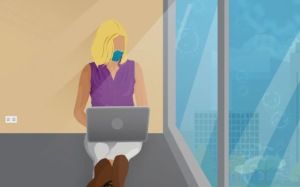Opinion
Union Views: Coronavirus – a global game changer
Steen Vive
This article is more than 5 years old.

In the future, our whole faces will be masks (photo: Pixabay)
At the time of writing, Denmark is doing better at the Coronavirus Crisis than expected. That is, if we track the numbers of positive cases and the death toll. However, if we focus on our society’s economy, there is no doubt that it is not only in intensive care but also on a ventilator.
The outbreak of coronavirus has hit the world economy hard. Several international organisations point to noticeably negative impacts on GDP and employment.
According to the International Monetary Fund, the downturn in the world economy could be at least as severe as during the 2008 financial crisis.
Consequences in Denmark
This setback in individual countries is mutually reinforced through international trade and investment. For a small open economy such as Denmark, the world economy is particularly important, and usually the growth of our economy follows developments abroad.
According to our government, we are looking at a protracted recession. Dansk Industri estimates that between 30,000 and 75,000 employees may lose their jobs.
It is still too early to predict anything with certainty. However, our economy had a strong starting point, with high employment and sound public finances. I hope our flexible labour market and strong social safety net contributes to a quick recovery. Yet I realise that we are all affected.
Digital transformation
At a minimum, our work situation has changed significantly. For desk workers like me, days at the office have been traded for working from home, which forces us to collaborate effectively with colleagues miles apart.
According to the annual survey of digitisation in Europe in 2019, we are among the European leaders at using internet services and for the spread of broadband. This has been a huge benefit during the Coronavirus Crisis.
We have witnessed a transition. Working from home, we are receiving a digital education and learning about new business models. Many of us are mastering what had previously seemed difficult: skills we would have not thought possible to acquire in just a few weeks.
I hope the transition we experience will serve as a catalyst for a digital transformation – one in which we establish new business models and ways to work in collaborative relationships that thrive. It could be a transformation that we will remember as a positive outcome in a post-coronavirus reality.

About
Steen Vive
Steen is a senior adviser at the Djøf trade union, a professional organisation representing members who study or work within the areas of law, economics, strategy, management, politics, administration, business, research, communication and more. He is a blogger and manager of various projects aimed at generating jobs in the private sector. In this column he writes about trends and tendencies in the labour market. Follow him on Twitter @SteenVive.










































